Book contents
Postscript: The Early Elizabethan Church
Summary
On 17 November 1558, between five and six in the morning, and in the sixth year of her reign, Queen Mary died. The news came as no very great surprise, either to the court or to the citizens of London, because her health, never very robust, had been in visible decline for over a month. Elizabeth cannot have been very surprised either because although, according to the traditional story, she was walking in the park at Hatfield when the news reached her, she had in fact been preparing for this moment for some time. Her supporters had been quietly mobilized in case Mary should change her mind at the last minute, and she had been tormenting Philip's special envoy, the Count of Feria, with speculations about her intentions. Between eleven and twelve o'clock that same morning Elizabeth was proclaimed in Cheapside as Queen of England, France and Ireland, and Defender of the Faith by ‘dyvers haroldes of armes’, supported by the assembled nobility of England. The same day the bells of all the city churches rang out, and that night parties and bonfires were set in the streets ‘for the newe quen Elizabeth, quen Mare syster’. Feria had been rightly apprehensive about the Queen's attitude to religion, but for the time being nothing was said. On 19 November Te Deum Laudamus was sung in every church in London, and the following day William Bill, her chaplain, preached at Paul's Cross and made (according to Henry Machyn) a ‘godly sermon’, from which we may conclude that it was uncontroversial. There had been a great deal of anxiety abroad about what would, or might, happen when Queen Mary died. Elizabeth was illegitimate, and relations between the two women were notoriously bad. Would King Philip attempt to ignore his marriage treaty and secure the succession for himself, or would some other pretender emerge? When the new Queen was unchallenged, the country breathed a collective sigh of relief.
- Type
- Chapter
- Information
- The Religious Culture of Marian England , pp. 145 - 156Publisher: Pickering & ChattoFirst published in: 2014



